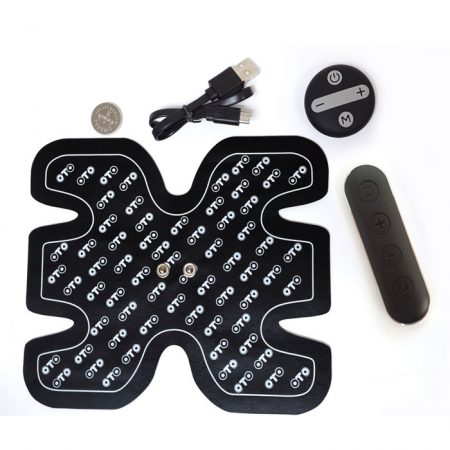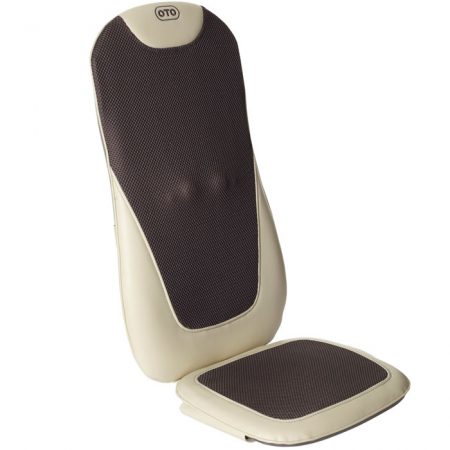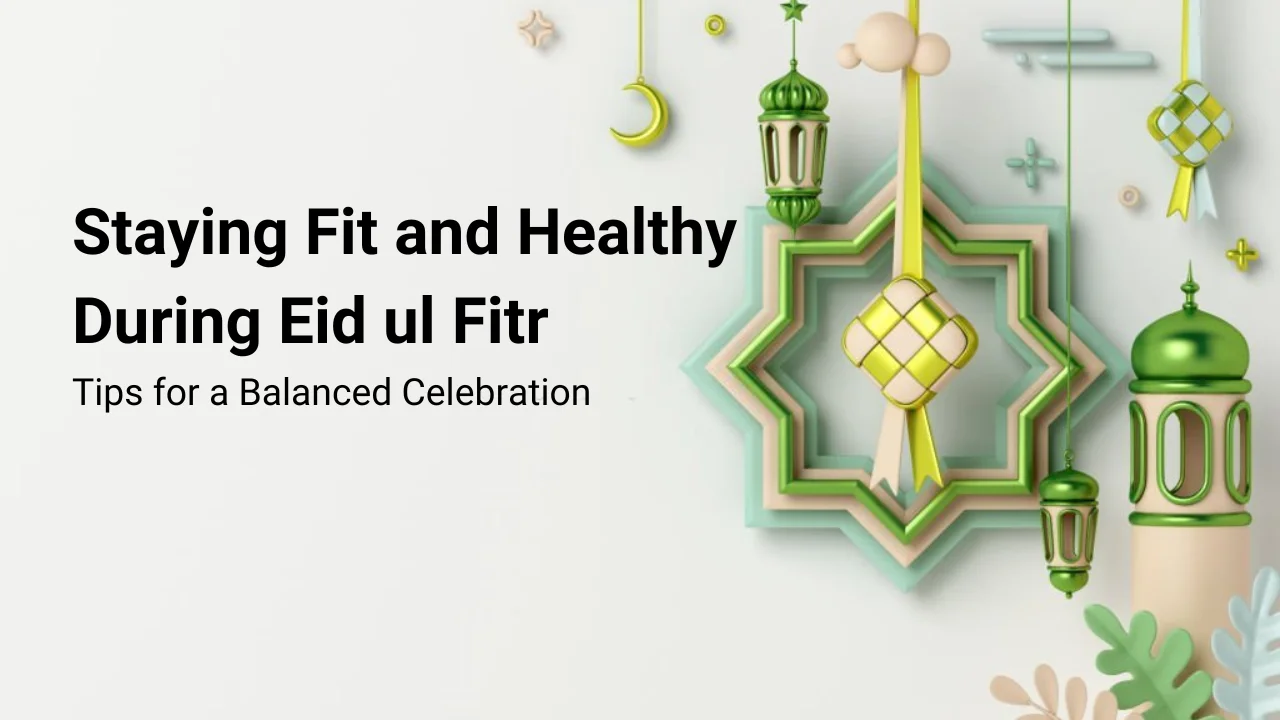Eid ul Fitr, one of the most significant Muslim festivals, marks the end of the holy month of Ramadan. It’s a time of celebration, gratitude, and joy as Muslims worldwide come together to celebrate with family, friends, and loved ones.
However, as we immerse ourselves in the festivities and indulge in delicious food, sweets, and sugary drinks, it can be easy to neglect our health and fitness goals.
While it’s essential to celebrate and enjoy this special occasion, it’s equally vital to maintain a healthy and balanced lifestyle during Eid ul Fitr.
In this blog post, we’ll share some practical tips for staying fit and healthy during the festivities while still enjoying the delicious food and socializing with loved ones. By incorporating these tips into your Eid ul Fitr celebration, you can ensure a happy and healthy time with your family and friends.
Mindful Eating
One of the essential aspects of staying healthy during Eid ul Fitr is practicing mindful eating. With a plethora of delicious food and sweets available during the festive season, it can be tempting to indulge in everything without considering portion sizes or nutritional value. However, practicing mindful eating can help you enjoy the food while maintaining a balance that’s good for your health.
Here are some tips for mindful eating during Eid ul Fitr:
- Practice portion control: Instead of piling your plate with all the delicious dishes, start with smaller portions and savor each bite mindfully. This can help you avoid overeating and keep your calorie intake in check.
- Choose healthier options: While it’s essential to enjoy the traditional festive food, try to include healthier options in your meals, such as salads, fruits, and grilled or baked dishes.
- Slow down and savor: Take your time to chew your food slowly and savor each bite mindfully. This can help you enjoy the flavors and textures of the food while giving your brain time to register when you’re full.
- Avoid excessive sweets and sugary drinks: While it’s tempting to indulge in sweets and sugary drinks, try to limit your consumption to a reasonable amount. You can also opt for healthier options like fruit salad or fresh juice.
By practicing mindful eating during Eid ul Fitr, you can enjoy the food while also maintaining a healthy balance that’s good for your body.
Staying Active
Staying physically active during Eid ul Fitr celebrations is essential for maintaining your fitness and overall health. With busy schedules and indulgent meals, it’s crucial to find ways to incorporate physical activity into your festive routine.
Here are some tips for staying active during Eid ul Fitr:
- Go for a walk: After a delicious meal, take a leisurely walk with your family or friends. Walking is a simple and effective way to stay active, and it can also be a great opportunity for bonding and conversation.
- Play outdoor games: Organize friendly outdoor games like cricket, soccer, or badminton with your loved ones. Not only will you have fun, but you’ll also get some exercise in the process.
- Dance: Dancing is a great way to get your heart rate up and burn calories. Play some upbeat music and dance to your favorite tunes, whether it’s traditional Eid songs or contemporary hits.
- Schedule workout sessions: If you have a regular workout routine, try to stick to it during Eid ul Fitr celebrations as well. You can plan your workouts in the morning before the festivities begin or find time during the day to squeeze in a quick workout session.
- Stay active in your daily activities: Look for opportunities to be active in your daily activities, such as taking the stairs instead of the elevator, doing household chores, or going for short walks in between gatherings.
Remember, staying active during Eid ul Fitr doesn’t have to be complicated or time-consuming. It’s about finding small ways to incorporate physical activity into your festive routine and making it a priority for your health and well-being.
Hydration
Staying hydrated is crucial for overall health and well-being, especially during the festive season of Eid ul Fitr. With the long days of fasting during Ramadan and the potential heat and humidity during Eid ul Fitr celebrations, it’s important to pay attention to your hydration levels to stay healthy and energized.
Here are some tips for staying hydrated during Eid ul Fitr:
- Drink plenty of water: Make sure to drink enough water throughout the day to replenish the fluids lost during fasting and to stay hydrated during the festivities. Keep a water bottle handy and sip on water regularly, even if you don’t feel thirsty.
- Limit sugary drinks: While it’s tempting to indulge in sugary drinks like soda or fruit juices, they can contribute to excess sugar intake and dehydration. Opt for water, coconut water, or herbal teas instead to quench your thirst and stay hydrated.
- Eat hydrating foods: Incorporate hydrating foods into your meals, such as fruits and vegetables with high water content, like watermelon, cucumbers, oranges, and strawberries. These foods not only provide essential nutrients but also help keep you hydrated.
- Avoid excessive caffeine and alcohol: Caffeine and alcohol can have a diuretic effect, leading to increased fluid loss and dehydration. Limit your consumption of caffeinated beverages like coffee and tea, and consume alcohol in moderation, if at all.
- Monitor urine color: Keep an eye on the color of your urine. If it’s pale yellow or clear, it’s a good indication that you’re adequately hydrated. If it’s dark yellow or amber, it may be a sign that you need to drink more water.
Proper hydration is essential for maintaining your energy levels, supporting your body’s functions, and staying healthy during Eid ul Fitr. By making hydration a priority, you can ensure that you’re taking care of your body and enjoying the festivities to the fullest.
Getting Enough Rest
With the excitement and socializing that comes with Eid ul Fitr celebrations, it’s easy to get caught up in the festivities and neglect getting enough rest. However, getting adequate rest is crucial for maintaining your health and well-being, both during the festive season and beyond.
Here are some tips for getting enough rest during Eid ul Fitr:
- Maintain a regular sleep schedule: Try to maintain a regular sleep schedule, even during the festive season. Aim to get 7-8 hours of sleep each night to ensure your body has time to rest and recover.
- Take short naps: If you’re feeling tired during the day, take short power naps to recharge your energy levels. Aim for 20-30 minute naps to avoid disrupting your sleep at night.
- Create a relaxing bedtime routine: Establish a relaxing bedtime routine to help you wind down and prepare for sleep. This can include activities like reading a book, taking a warm bath, or practicing relaxation techniques like deep breathing or meditation.
- Limit screen time: The blue light emitted by electronic devices can disrupt your body’s natural sleep-wake cycle and make it harder to fall asleep. Limit your screen time before bed and avoid using electronic devices in the bedroom.
- Listen to your body: Pay attention to your body’s signals and rest when you need to. Don’t push yourself to stay up late or attend every gathering if you’re feeling tired or overwhelmed.
Getting enough rest is crucial for maintaining your energy levels, supporting your immune system, and promoting overall health and well-being. By prioritizing rest during Eid ul Fitr celebrations, you can ensure that you’re taking care of your body and enjoying the festivities to the fullest.
Managing Stress
Eid ul Fitr can be a busy and overwhelming time with various social obligations, preparations, and expectations. It’s important to manage stress during this time to ensure a balanced celebration and maintain your physical and mental well-being.
Here are some tips for managing stress during Eid ul Fitr:
- Plan and prioritize: Create a plan and prioritize your tasks and activities during Eid ul Fitr. Make a to-do list, set realistic expectations, and avoid overcommitting yourself. Delegate tasks to family members or friends to share the workload and reduce stress.
- Practice self-care: Take care of yourself by engaging in self-care activities. This can include exercise, meditation, deep breathing, or spending time doing things you enjoy. Taking care of your physical and mental health will help you better manage stress.
- Set boundaries: It’s important to set boundaries during Eid ul Fitr to avoid becoming overwhelmed. Learn to say no when needed and communicate your limits to others. Don’t feel pressured to attend every event or gathering if it’s too much for you.
- Connect with loved ones: Spend quality time with your loved ones and engage in meaningful connections. Share your thoughts, feelings, and concerns with trusted family members or friends. Social support can help reduce stress and provide emotional comfort.
- Practice mindfulness: Practice mindfulness by being present in the moment and focusing on the positive aspects of the festivities. Avoid dwelling on stressful situations or worries about the future. Mindfulness techniques, such as meditation or breathing exercises, can help you stay calm and centered.
- Get professional help if needed: If you’re feeling overwhelmed or struggling with managing stress, don’t hesitate to seek professional help. A therapist, counselor, or mental health professional can provide support and guidance to help you cope with stress effectively.
Managing stress during Eid ul Fitr is crucial for maintaining your overall well-being. By incorporating stress management techniques into your routine, you can ensure a balanced and enjoyable celebration. Remember to take care of yourself, set boundaries, and seek help when needed to effectively manage stress during this festive season.
Prioritizing Mental Health
Amidst the hustle and bustle of Eid ul Fitr celebrations, it’s important to prioritize your mental health. Taking care of your mental well-being is crucial for overall health and happiness, and can contribute to a more balanced and enjoyable celebration.
Here are some tips for prioritizing mental health during Eid ul Fitr:
- Take breaks for self-reflection: Amidst the celebrations, take breaks for self-reflection. Reflect on your thoughts, feelings, and emotions. Practice self-awareness and acknowledge any stress, anxiety, or negative emotions that may arise during the festivities.
- Practice self-compassion: Be kind and compassionate towards yourself. Don’t put excessive pressure on yourself to meet societal expectations or compare yourself with others. Embrace imperfections and practice self-love and self-acceptance.
- Engage in activities that bring you joy: Engage in activities that bring you joy and make you happy. This could be spending time with loved ones, pursuing hobbies, or engaging in activities that help you relax and unwind. Prioritize activities that nourish your soul and boost your mental well-being.
- Set healthy boundaries: Set healthy boundaries to protect your mental health. Learn to say no when needed, and don’t feel obligated to attend every event or gathering. Prioritize your own well-being and don’t overextend yourself.
- Seek support: If you’re feeling overwhelmed or struggling with your mental health, don’t hesitate to seek support. Talk to a trusted friend, family member, or mental health professional. Seeking support and talking about your feelings can help you manage stress and improve your mental well-being.
- Practice stress-reducing techniques: Incorporate stress-reducing techniques into your routine, such as mindfulness, deep breathing, or meditation. These techniques can help you manage stress, reduce anxiety, and improve your mental well-being.
- Limit social media usage: Social media can sometimes contribute to feelings of comparison, anxiety, and stress. Limit your social media usage during Eid ul Fitr and focus on real-life connections and experiences instead.
Prioritizing your mental health during Eid ul Fitr is crucial for maintaining overall well-being. By practicing self-compassion, setting healthy boundaries, seeking support when needed, and engaging in activities that bring you joy, you can prioritize your mental health and have a more balanced and fulfilling celebration.
Balancing Socializing and Rest
Eid ul Fitr is a time for socializing and spending time with loved ones. However, it’s also important to balance socializing with rest and relaxation to avoid burnout and maintain your well-being.
Here are some tips for balancing socializing and rest during Eid ul Fitr:
- Set a schedule: Create a schedule that includes time for socializing as well as rest and relaxation. Set realistic expectations for yourself and prioritize your physical and mental health. Make sure to include breaks and downtime in your schedule.
- Listen to your body: Pay attention to your body and listen to its needs. If you’re feeling tired or overwhelmed, take a break and rest. Avoid overextending yourself and know your limits.
- Plan ahead: Plan ahead for socializing events and gatherings. If you know you have a busy day or week ahead, make sure to schedule rest and relaxation time before and after the event. This can help you avoid burnout and maintain your energy levels.
- Prioritize quality over quantity: Instead of trying to attend every event or gathering, prioritize quality over quantity. Focus on spending quality time with loved ones and engaging in meaningful connections.
- Engage in restful activities: Engage in restful activities such as reading a book, taking a bath, or listening to calming music. These activities can help you recharge and rejuvenate after socializing events.
- Communicate your needs: Communicate your needs with your loved ones. Let them know if you need some alone time or if you’re feeling overwhelmed. Having open and honest communication can help you avoid burnout and maintain a healthy balance.
Balancing socializing and rest during Eid ul Fitr is crucial for maintaining your overall well-being. By setting a schedule, listening to your body, and prioritizing quality over quantity, you can have a more balanced and enjoyable celebration. Remember to prioritize your physical and mental health and communicate your needs with loved ones to avoid burnout and maintain a healthy balance.
Conclusion
Eid ul Fitr is a joyous celebration that brings families and communities together. While it’s a time for socializing, feasting, and enjoyment, it’s also important to prioritize your physical and mental health during this festive period.
By staying mindful of your eating, staying active, staying hydrated, getting enough rest, managing stress, prioritizing mental health, and balancing socializing with rest, you can ensure a more balanced and healthy celebration.
Remember to practice mindful eating, make time for physical activity, stay hydrated, prioritize restful sleep, manage stress effectively, and prioritize your mental health. Set healthy boundaries, communicate your needs, and take breaks for self-care. By taking care of your physical and mental well-being, you can enjoy Eid ul Fitr to the fullest.
May this Eid ul Fitr be a time of joy, celebration, and wellness for you and your loved ones. Eid Mubarak!










Leave a comment